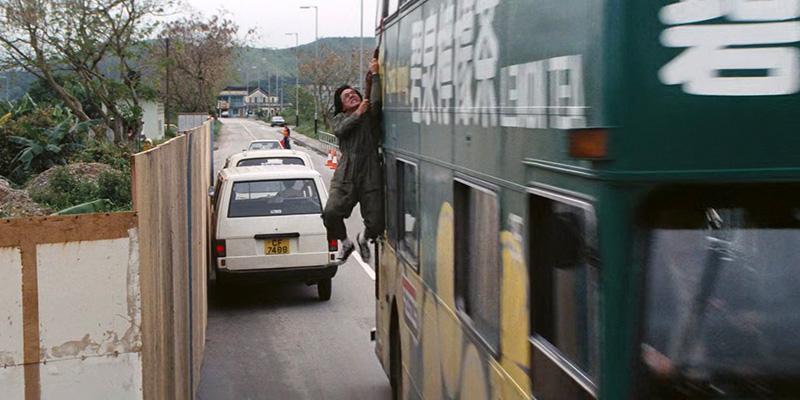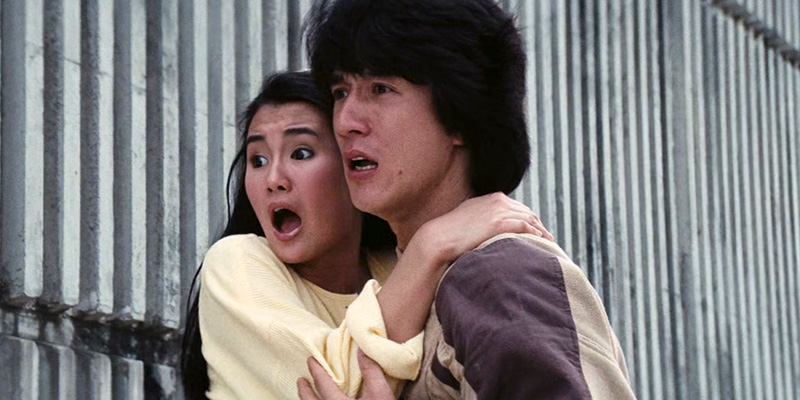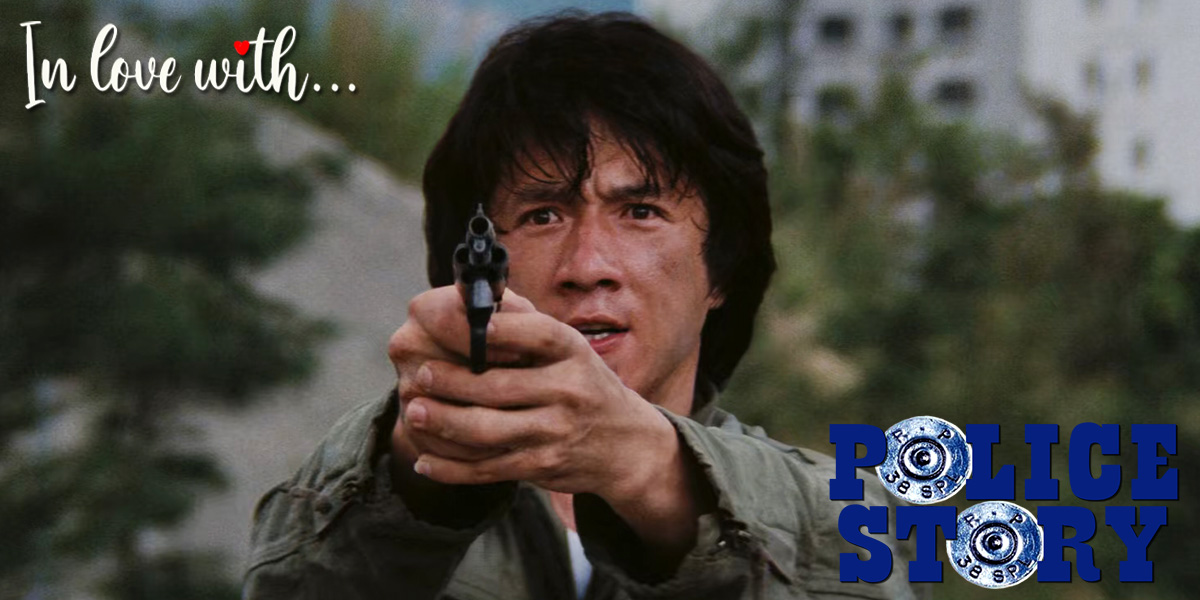I’m not sure who has infiltrated Sky Cinema in the UK, but these are heady times for subscribers. Recently, a goodly number of classic Hong Kong action films have been popping up on their service – when I first saw ‘Last Hurrah for Chivalry’ in their catalogue, I thought this was some fever dream I would wake up from. And yet the Bruce Lee films have popped up, there’s been a smattering of Michelle Yeoh, the Jet Li ‘Once Upon A Time in China’ movies and, of course, a wedge of classic Jackie Chan. On a service that used to think that Jackie Chan’s film career began with ‘Rush Hour’, we are now treated to ‘Project A’, ‘The Young Master’ and, in glorious 4k, ‘Police Story’.
‘Police Story’ is one of those films that I and many others have revered for many years and rightfully so. And yet, because of my respect for the film, I haven’t actually watched it for nearly a decade. Yes, I’ve seen the clips and the fight scenes, but I invariably switch over when I do as I have this strange reverence for certain films and TV series that means I refuse to watch them part of the way through (it drives my wife to distraction when I demand that she switches the channel lest I dishonour a masterpiece by relegating it to ‘something to leave on in the background’). But with Sky Cinema tantalising me with a 4k version and the knowledge that ‘Police Story’ is nearly 40 years old, I thought it was time to see if it still had the same magic as it did when I watched it on VHS in the late 80s. In a world of extravagant effects, spiralling budgets, multiverses and cars in space (see ‘Fast 9’), could it still excite?

I need not have worried too much. Great works of art are ageless. They might get re-evaluated, critiqued, imitated and parodied, but they always come out the other side with their reputations intact. Was ‘Jaws’ really that good? Wasn’t the shark rubbery? Hasn’t the lampooning taken its toll on its status? No, ‘Jaws’ remains an exceptional film. Having recently watched the IMAX re-issue of it at the cinema, I can confirm this. The same goes with ‘Police Story’. From the first few frames, the way it uses the briefing to offer some exposition, you know that this will be a production that will drag us in and not let us go until we are saying ‘ouch’ while we watch the closing credits. The shanty town chase sequence is still ridiculously good, more so when you know that this actually happened. Builders actually put together the sets and the chase was choreographed and planned meticulously and that red Mitsubishi actually ploughed through the corrugated metal homes. There is something especially powerful about this. To go from this show-stopping opening to the hero hanging from a double-decker bus with an (admittedly VERY robust) umbrella and then have the ludicrous sight of stuntmen being ejected from the top floor windows only to fall on the concrete below, ‘Police Story’ goes from remarkable to amazing. Seeing it again within the context of the story had me, mouth agape, looking at the screen as if it was the first time I’d ever seen it. Maybe getting older means that all of the punishment that the performers encounter twinges the bones a bit more (though I have never been launched through the window of a bus and onto the ground below).
What stood out to me when I first saw ‘Police Story’ many years ago was how it went from showing action of this nature, never to be forgotten, to being, for want of a better word, ‘funny’. The hero is brought back to earth in a few scenes that are genuinely amusing to this day and a world away from what you might expect in action cinema. The umbrella-holding, bus-swinging hero is now having birthday cakes smashed into his face or he is desperately trying to make things up to his girlfriend. To this day, I love the way Hong Kong heroes can go from death-defying to self-deprecating so effortlessly and ‘Police Story’ achieves this with aplomb. Naturally, you are waiting for the next action set-piece, but you are invested in the mundane world that it exists in, one where heroes in court cases can be undone by ‘Carry on’ style innuendo. The little moments of humour and the way they are acted is a joy and something I was happy to rediscover.

The other thing that struck me was how, when bombarded with extraordinary moments on first viewing, one can miss the little things that still required endeavour. Just the way Jackie Chan gets into Chu’s apartment, or the way one of the stuntmen is kicked into the air and falls through a collapsing table are amazing; it’s easy to forget how remarkable these moments are when they are hidden in bigger scenes. This is especially the case with the finale, which is replete with rewind-worthy moments. There is Brigitte Lin being thrown through a glass table or Fung Hak-On landing on an escalator in a particularly painful way. They all lead to Chan’s famous lighting pole stunt, but there are so many of them and they are so ridiculously risky that you wonder what madman conceived this. It would have been easy to show a performer get hit and simply cut away, saving them some bruises. But no, if you are involved in ‘Police Story’, you need to take on your own set of physical challenges. Even Chor Yuen getting propelled into a shopping trolley is a moment that really didn’t need to be filmed in such a prosaic way and yet you are glad it was. There is no easy way out for the cast; there are stunt doubles and the like, but the little moments remind you that everyone probably came away with a graze or bruise.
‘Police Story’ was exceptional. It still is exceptional and when I watch it in another few decades it will still be exceptional. It’s easy to forget this or to have this cynical ‘It was of its time’ mentality to dismiss it. It’s simply a masterpiece, the like of which we should always appreciate, especially as cinema gets more and more the work of computers and committees. An absolute delight – thank you to all involved.
- In Love With… One-Armed Swordsman - March 3, 2025
- In Love With… Enter the Clones of Bruce - November 25, 2024
- Two Toothful Tigers – Farewell to Lee Hoi-Sang and Norman Chui - September 22, 2024

